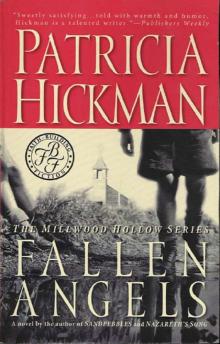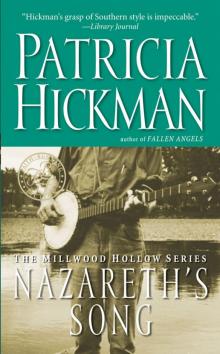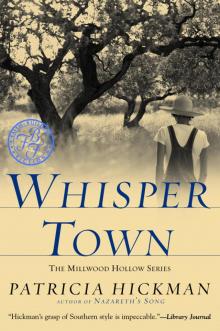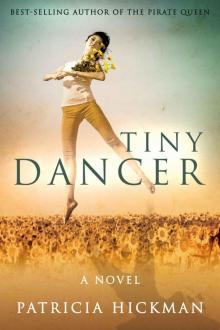- Home
- Patricia Hickman
Painted Dresses Page 3
Painted Dresses Read online
Page 3
Delia stared out toward the pond.
“It doesn’t matter,” I said.
Being right mattered to Delia. She stomped across the porch. Her right foot hit the fourth plank from the door. It squeaked. That squeaking always irritated Mother. I learned to step over it in the same manner that I developed the art of missing the two squeaks in the flooring outside my mother’s bedroom on those afternoons when Mother napped. To awaken her was like stumbling into a cave of bats, wings flailing, hands slapping. It fell to Delia to take the brunt of Mother’s rage, mostly, Mother said, because Delia did not have the common sense I had gained to avoid a quarrel.
Delia jiggled the door handle for a millisecond as though someone had locked her out. A pang of guilt hit me. I imagined Delia rising from the sand hills of her resolve and telling me, “Your assumptions of me, as usual, have missed the mark!” leaving me stunned and happy. Some girls have imaginary friends. I created an imaginary Delia who could banter and poke fun, throw in a four-syllable word every now and then to throw me off balance. I never knew how to make Delia laugh. We could never have fun with each other, not like Fanny and Tim.
Instead, Delia opened the door.
“Don’t be sad, Delia,” said Renni.
My sister’s foot crossed the entry. Renni obsessed at how the temperature continued to drop. The door slammed behind my sister. Porter could be heard scratching the paint off the doorpost. A high tenor whimper followed as though the pup had been winded.
Fanny cut out from behind the house to a silver compact car parked in the muddy field.
“Is she leaving?” I asked. “We haven’t had a chance to talk.”
Fanny grinned and waved, her arm a flag in the November wind.
Renni’s loafers came down flat. She cupped her coffee mug. “I’ll check on the soup, see what condition your family’s kitchen’s in. And,” she said heavily, “I’ll see to Delia.” She went inside.
Uncle Carl helped Fanny navigate to dry footing. Fanny, more prone to flashing livelier colors than we Sylers, wore a purple pantsuit, the jacket splayed open. Her breasts strained out of a V-neck knit top of a malachite color. She had grown a full set of boobs by age nine. At age twenty-seven she had put on a pound or two.
I met Fanny out on the lawn. She hefted a bag of preschool toys.
“What’s it like in there?” I asked. I stared past her through the front windowpanes into the living room.
“There’s plenty to eat. You hungry?” she asked.
A Canada goose chose that instant to crash-land six feet out from the porch where Fanny and I stood. “Stupid bird,” I said and carried the toy bag behind her.
Fanny’s hair blew forward and stuck to her cheeks. “What with Thanksgiving and all coming, I had to grab what I could get. It’s hard to know how much to bring the week of a funeral. It snowed Monday for just an instant, Mother said, just as your father passed.” She sounded melancholy when she said, “It never snows in Boiling Waters. Least not that I remember.”
“The aunts are still making soup,” I said. We climbed the stairs to the porch. “Let’s talk.” I offered her the rocking chair.
Fanny said whatever came to mind, as did Delia and most of the Syler women. “That Delia’s got tangled up with some bad business, Gaylen. That guy she’s dating, Freddy, he’s never held down a job for long. She attracts the wrong man like nobody’s business.”
My younger sister had gone to the emergency room twice after a series of fights with Leland. Her second man, the short live-in name of Ray, had the unfortunate hobby of growing weed in the backyard. After an interview with the Boiling Waters deputy, Deputy Bob, Ray was fixed up with a fine set of wrist jewelry and new living arrangements. He had lived with Delia for a solid month.
Fanny said suddenly, “Gaylen, your arm. I heard you broke it in the crash. You were all over the evening news. You crashed in Charlotte, right?”
“I crashed into a Wal-Mart north of Charlotte,” I said. “Is that funny?” I asked, for Fanny was laughing so loudly it set the dog inside to howling. Better that Fanny laughed about it. She was the first to laugh, me confessing how Braden’s fairly new Embraer took a nosedive into Big Box heaven. Fanny snorted through her nose. I laughed with her.
“When I heard it on the news, I nearly died. Your daddy about had a fit over it. You know how he ranted. Like my daddy. Are you scared to fly now?”
“I’m grounded pending the investigation. I hadn’t been in the air more than five minutes, started losing altitude.”
“Wal-Mart. You didn’t kill anyone, did you? Land on anyone, I mean?”
“I hit the garden center. It wasn’t such a big deal. November’s not a big gardening month,” I said. I had flown too low to the ground, truth be told, and stalled out.
A woman in a blue smock started screaming. You can’t remember exactly what happens when you crash. I don’t care what people say. But I could hear her voice, the screaming, and she was yelling, “Drag out the insecticide, or we’ll all blow up!” She kept yelling until I was shoved into the ambulance. I could see her face as the attendant closed the ambulance doors. She was eating cheese nachos, shoving one tortilla chip after another into her mouth. And then I was driven to NorthEast Medical Center.
“Your husband must have nearly died when he heard the news,” she said. “Did he almost die hearing it?”
Made Braden tender, perhaps, but the distance between us was exaggerated by the accident. “He was relieved that I made out so well,” I said. I was almost positive he said he was relieved.
“I’ll bet he was sick to hear your father had passed. Everybody said that Uncle James loved your husband as much as his two girls. Who told me that? Anyway.”
Two shots exploded from the woods.
“Oh, those men are out shooting guns so early. I hate the sound of it,” she said.
Her mother opened the front door. “Lunch is ready in five minutes,” she told us and shut the door. The front windows vibrated.
A minute passed and the door opened again, only slowly. Delia peered out. “Did Aunt Renni call you two to lunch? I guess you heard, Fanny, that Gaylen and Braden are splitting the sheets.” She ducked back inside when Aunt Renni yelled for her to bring more chairs into the dining room. “It is getting colder. Wonder if it’ll snow?” She closed the door.
I sat staring into the deer woods. A faint drizzle blew across the porch. My jacket was too thin for the worsening weather.
“Gaylen,” Fanny said, leaning toward me, “I know how the family talks. But I don’t listen unless I hear it straight from the source.”
That made five times I was asked, once by each aunt and then Fanny. “Braden might leave me. Temporarily.”
“And you with a broken arm! Is he crazy?”
“He doesn’t mean it.”
Fanny had a comforting tone. She extended her enameled nails, lifting the tips, tapping my arm. “I’ve missed you,” I said.
“Me too.” She clasped my arm. “We live too far apart.” She and her husband, Dill, had moved to Durham.
“You’re looking fine.”
“And you, Gaylen. Like the hair color. Auburn is back,” said Fanny. “You’re a little on the thin side, but I’d expect it, considering. I did remember you as much shorter.” She did not ask about Braden again.
“Five eight is short by Syler standards,” I said. “I finally stopped growing. Not like Delia. She’s almost tall as Tim.”
Delia stuck her head out the front door once more. She blinked without saying a word.
“We’re coming,” I said.
“Come in for soup, and see my new dog do a trick,” Delia told Fanny. “I’m gon’ train it to dust things.”
The aunts had packed up and left all their baggage by the door.
Fanny hefted the bag of toys and the diaper bag inside. I glanced across th
e field. The interior light of her car was on. She had not closed her car door all the way. I walked out to the field and shut the door. Then I walked behind my father’s garage to cry. I waited at the corner of the garage until I was certain no one was watching. I slid along the back garage wall until all I could see was the deer woods out in front of me. I sobbed convulsively.
The air turned callous. Sleet and rain sifted like salt into the uncovered trees. A vertical sheet swept across the pond and into the woods. Tim and the guys were completely out of earshot. A buck bolted from a copse of trees, the rack and hooves lifting fluidly, the eyes aimed straight at me and then vanishing. It seemed as if I had seen a ghost, but that’s how your eyes play tricks when you see a white animal flying through rain. Tim’s deer was gone as quickly as it had come.
3
TIM CONDUCTED TWO male cousins, hands in pockets, across the lawn and toward the house. Grass blades, stiff icicles, snapped underfoot. My other two cousins, Blaine and Andy Pearson, weathered the cold to take in a movie and then go off for drinks. Boiling Waters’ only hot spot was a bar fixed like a lantern on the town limits. Tim served the Blue Water Cafe as bartender one summer, home from a California college. He could not take the long trek home without haunting the local dive. “I’ll catch up with you later,” he promised as the guys split off.
The firmament darkened as the cold front took hold, leaving a dusting of stars exposed through a small window of sky. The front dragged a tail of arctic weather into the county. The black sky was dense as though the air holes to earth were shut off.
I wanted the house to myself, but to Tim I said only, “I’m so tired.” My forearm ached from the pangs.
“I’ll make you some coffee,” he said, carrying his gun aimed at the ground. “Heard from Braden?”
I shivered and avoided his question. Porter’s paw prints dappled the muddy ground. By morning the predicted hard freeze would turn the ruts into frozen cavities.
Since the aunts all offered their good-byes once the soup bowls were washed and put away, the house was stilly silent, as if nothing but moths lived inside. Lilly left for Raleigh. Renni and Tootie retreated into the hamlet two towns away called Siphon. Fanny drove Delia back to the trailer to feed her animals.
The back porch light illuminated the walk the rest of the way. I pulled open the screen door. A coarse wind blew sleet into my eyes. I squinted and the wind took the screen door out of my hand until Tim grabbed it and helped me inside.
“Finally. Quiet,” he said. He carried my father’s rifle to the gun cabinet behind the dining table and locked it inside. He put the key atop the cabinet, as was my father’s habit.
The kitchen remained as my mother had left it. A framed photo of Delia and me was wedged between a loaf of bread and a nearly empty cereal box on top of the refrigerator. Mother had cleaned off the top of the appliance one day, wiping away the dark kitchen residue that forms in places above eye level. The photo snapped by Aunt Renni was the last one taken of Delia and me together. Ever. We posed on the diving end of the small square dock’s north shore. Delia’s two front teeth had not grown in. My hair was pulled into double braids. We wore identical pink bikinis. Delia had taken a growing spurt and outgrown me by a good inch. Her shoulders stooped forward, her two small hands covering her stomach. Her eyes were cast toward the water.
She had learned to swim and took to it so well I called her the Mermaid of Sylers Pond. She won first place in a swim race at the city pool. I was both jealous and astounded when her hand slapped the pool ledge and the whistle blew. She was a natural at water sports but couldn’t stick out the class to finish Red Cross training the summer I became a lifeguard.
To look at us in that photograph, we were a genial pair of sisters, swapping pokes in the arm.
Tim saw me looking at the photo. He had known me long enough to know the pain between Delia and me.
“Sorry you didn’t bag your deer,” I said.
“That Blaine. He’s an awful shot. Shouldn’t have taken him. Never could hit a moving target. He’s nothing but a big dumb nut.” Tim laughed as he always did when he did not know what to say. I had known him to laugh when his baseball team lost a game. It was a nervous laugh.
“You see that white deer again?” I asked.
“I’m not lying. I got up early to go walking in your daddy’s field. The rest of the house wasn’t up. Right smack in the clearing, he came down for a drink at the lake. Pale brown spots on his rump. You know, like a photo negative. Stop looking at me like that.”
I debated whether or not to tell him I had seen his deer. Truth be told, I was not certain what I had seen.
He jabbed me under the arm.
“Stop, I’m not in the mood,” I said.
“I see something in your eyes. Want to tell me what it is?”
I ran my finger over one lid. “Is it a smudge?”
“I mean inside you.” Tim was still standing against the door. “You got this funny look. I can’t get anything out of Fanny. You women are all bullheaded, like you got this club and no guy can come in.”
I fished a can of coffee from out of the dish cabinet.
“Where’s Fanny?” he asked.
“She wanted to see Delia’s place.”
“Too depressing to stay around here,” he said, pulling out a chair for me and then one for him.
“I think that’s why. That and she didn’t believe Delia kept chickens in her kitchen.” I dug out the can opener. The coffee hissed open.
“You and Delia still go at it?” The funny tilt of his head was his way of telegraphing that he was not all about goading me this time.
“Delia? No. At least, I don’t take the bait. I let her win is what I mean.” I wanted to let Delia win would have been more truthful, but the emotional issues took too long to explain. This week was the first time I had seen her in over a year. If I admitted that, he’d call me inhuman for staying away so long.
“She’s not so nuts like everybody says,” said Tim. I spilled the coffee grounds but kept talking as if I hadn’t. “I don’t mind her.” Tim was always one year ahead of me in school, thus two years older than Delia. The distance helped his perspective.
I kept sifting grounds into the coffee filter. “I’m glad you see good in Delia.” I wasn’t lying. Delia got to me only when she scared people around her, usually a stranger who did not understand her ways.
He took the filled filter, hefting it one-handedly. “I said I’d make the coffee.” He gave me one of his annoying redneck hip bumps, nudging me away from the counter.
“Don’t treat me like an invalid,” I said. I didn’t like him coddling me. Delia took to Tim’s indulgences better than I did.
His belt buckle flashed, silver chrome shaped into the face of a race car driver. He dressed in boot-cut Levis, faded and straight as a razor. He’d thrown on a rumpled plaid shirt, unbuttoned and, under that, a screen-printed T-shirt. Across his toned chest, a largemouth bass fishtailed into the air.
I pulled two cups out of the dish drainer. “You haven’t said much about Meredith. How’s the wife, Tim?” Fanny mentioned Meredith had taken ill.
“I’m calling her tonight. I hated leaving her. But she’s got this idea in her head she can cure herself through herbs and whatnot. Then there’s her tedious budget. She wants us to build this dream house. It’s a bungalow really. Nobody is building bungalows in Colorado. Then she found me this low-budget flight, said I ought to come, but that she’d stay home and heal.” He peeked into the water-well lid on the coffee maker. “She’ll do it too. Meredith’s got, like, these steel guts.”
“I’ve flown those budgets before. Six layovers … go up … down.”
“Thought I would be sick.”
“I’m glad you have Meredith.”
“You didn’t exactly marry a slouch yourself.” Tim forgot to fill the coffee well.
“The nights just started.”
Beads of water hissed under the carafe. Tim put me at ease. Made me want to confess. He had had that effect on me since adolescence. “I want to ask you something. Do I seem uptight?”
He squeezed my good upper arm. “If you were wound up any tighter, you’d spring.”
“I don’t mean to be.”
“Who’s been saying you’re uptight, Syler? Not Braden. He wouldn’t.” He thought highly of Braden. During the NASCAR season, my husband would fly Tim and three of his buddies to Concord, where they would gather for beers at the racetrack.
“No one’s said that,” I said. I hadn’t been called Syler in five years. I grew tense but couldn’t say why. Several Bundt cakes had been left sitting out on the counter. “Who bakes all these anyway?”
“You have to get caught up on your funeral traditions. When Dad died, Bundt cakes were stacked all over Mom’s kitchen,” said Tim. “It’s what people do when they don’t know what to do.”
“Maybe they stand for something. They’re circular. Is that spiritual?”
“No.”
“Think people bake them because they’re trying to express the hole they feel,” I asked, “when they lose someone?”
“It’s a cake with a hole. You think too hard. You’ll give yourself one of those headaches.”
I swung the conversation away from me, headaches, or broken arms. I was back home where I was known as one of the Syler girls, the unsung women whom neighbors whispered about on porches, yet smiled and waved at when Mother drove us past. Tim’s persistent questions still hit my vulnerabilities so I changed the subject. “What’s different about you?” I asked. There were dark circles under his eyes, but he had stayed up late the night before.
“I feel old.”
“Coffee’s ready.” I filled the two cups and placed the carafe back under the filter to finish brewing. I set a cup in front of him. “Hard to believe my mother kept this old Formica table.”

 Painted Dresses
Painted Dresses The Pirate Queen
The Pirate Queen Fallen Angels
Fallen Angels Earthly Vows
Earthly Vows Nazareth's Song
Nazareth's Song Whisper Town
Whisper Town Tiny Dancer
Tiny Dancer